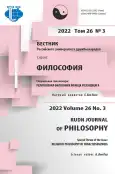Rosenzweig and Bakhtin. Hermeneutics of Language and Verbal Art in the System of the Philosophy of Dialogue
- 作者: Dvorkin I.1
-
隶属关系:
- Hebrew University of Jerusalem
- 期: 卷 26, 编号 3 (2022): RELIGIOUS PHILOSOPHY OF FRANZ ROSENZWEIG
- 页面: 537-556
- 栏目: RELIGIOUS PHILOSOPHY OF FRANZ ROSENZWEIG
- URL: https://journal-vniispk.ru/2313-2302/article/view/325307
- DOI: https://doi.org/10.22363/2313-2302-2022-26-3-537-556
- ID: 325307
如何引用文章
全文:
详细
For all the differences in the teachings and fate of Franz Rosenzweig and Mikhail Bakhtin, comparing them with one another is extremely instructive and reveals important and often lost meanings of 20th-century philosophy. Bakhtin made his debut in 1929 as the author of Problems of Dostoevsky’s Creative Art, but then went into exile for sufficient years and emerged from oblivion only in the 1960s. Rosenzweig died in 1929 and was almost forgotten for many years. Now, almost a century later, we see in Bakhtin’s philosophy, especially in his early works, and in Rosenzweig’s philosophy very much in common. Both sought to create a new philosophical system that radically rethinks the subject of philosophy. Both went beyond the traditional New European ontology, both recognized the fundamentality of language and language arts in the philosophy of the future, and, finally, both became the creators of the philosophy of dialogue as an important trend in 20th-century thought. For all that, there were many cultural, religious, and intellectual differences between Bakhtin and Rosenzweig. However, consideration of both the commonalities and differences in their philosophical systems is extremely fruitful not only for the cultural history of the 20th century but also for philosophical studies of the future.
作者简介
Ilya Dvorkin
Hebrew University of Jerusalem
编辑信件的主要联系方式.
Email: idvorkin@mail.ru
ORCID iD: 0000-0002-3431-8071
Director of the Educational Programs at International Center for University Teaching of Jewish Civilization
Mt. Scopus, Jerusalem, 9190501, Israel参考
- Perlina N. Bakhtin and Buber: Problems of Dialogic Imagination. Studies in 20th Century Literature. 1984:9(1):13-28. https://doi.org/10.4148/2334-4415.1149
- Friedman M. Martin Buber and Mikhail Bakhtin: The Dialogue of Voices and the Word that is Spoken. In: Dialogue as a Means of Collective Communication. Banathy B and Jenlink PM, editors. New York: Kluwer Academic/Plenum Publishers; 2005. p. 29-40.
- Makhlin VL. I and the Other: Towards the History of the Dialogical Principle in the Philosophy of the Twentieth Century. Moscow: Labirint; 1997. (In Russian).
- Frank SL. Mystical Philosophy of Rosenzweig. Put`. 1926;(2):139-148. (In Russian).
- Belov VN. Review on the book: Franz Rosenzweig. The Star of Redemption. Voprosy filosofii. 2018;(7):218-220. (In Russian).
- Nikolaev NI. Lectures and speeches of M. M. Bakhtin 1924-1925, in the notes of Pumpyatnsky LV. In: Bakhtin MM as a Philosopher. Moscow: Nauka; 1992. p. 221-252. (In Russian).
- Dvorkin I. Bakhtin and Cohen: The First Stages in Building the Philosophical System. RUDN Journal of Philosophy. 2021;25(3):436-456. https://doi.org/10.22363/2313-2302-2021-25-3-436-456
- Rosenzweig F. The Star of Redemption. Galli BE (tr.). Madison, WI: University of Wisconsin Press; 2005.
- Dvorkin I. The Place of Hermann Cohen’s Ideas in the Philosophy of Dialogue. Kantian Journal. 2020;39(4):62-94. (In Russian). https://doi.org/10.5922/0207-6918-2020-4-3
- Holquist M. Dialogism Bakhtin and his World. London and New York: Routledge; 2002.
- Soboleva M. Die Philosophie Michail Bachtins. Von der existenziellen Ontologie zur dialogischen Vernunft. Hildesheim: Georg Olms Verlag; 2010.
- Bienenstock M. Cohen face à Rosenzweig: Débat sur la pensée allemande. Paris: Vrin; 2009.
- Bakhtin MM. Art and answerability: Early Philosophical Essays. Holquist M and Liapunov V, editors. Liapunov V (tr.). Texas: University of Texas Press; 1990.
- Bakhtin MM. Toward a philosophy of the Act. Holquist M and Liapunov V, editors. Liapunov V (tr.). Texas: University of Texas Press; 1999.
- Rosenzweig F. The New Thinking. In: Philosophical and Theological Writings. Franks PW and Morgan ML, editors and tr. Indianapolis: Hacket; 2000. p. 109-139.
- Makhlin VL. “Systematic concept” (Notes on the history of the Nevelskoy school). Nevel’skij sbornik. 1996;(1):75-88. (In Russian).
- Pollock B. Franz Rosenzweig and the Systematic Task of Philosophy. New York: Cambridge University Press; 2009.
- Dvorkin I. The Concept of Grammatical Organon in the Star of Redemption by Rosenzweig. Religions. 2021;12(945):1-13. https://doi.org/10.3390/rel12110945
- Makhlin VL. “Participatory thinking”. Philosophical project of M.M. Bakhtin in the context of the ontological turn of the 20th century. Istoriko-filosofskiy ezhegodnik. 2018;33:267-292. (In Russian). https://doi.org/10.21267/AQUILO.2018.33.21039.
- Buber M. The History of the Dialogical Principle. In: Between Man and Man. Gregor-Smith R (tr.). London and New York: Routledge; 2002. p. 249-264.
- Casper B. Das dialogische Denken: Eine Untersuchung der religionsphilosophischen Bedeutung Franz Rosenzweigs, Ferdinand Ebners und Martin Bubers. Freiburg, Basel & Wien: Herder; 1967.
- Lyapunov V. A few unpretentious recommendations for readers of Bakhtin. Bakhtinskiy sbornik. 2004;5:195-209. (In Russian).
- Kant I. Critique of Pure Reason. Guyer P and Wood AW (tr.). Cambridge: Cambridge University Press; 1998.
- Bakhtin MM. Collected Works. Vol. 1. Moscow: Yazyki slavyanskikh kultur; 2003. (In Russian).
- Cohen H. Religion of Reason out of the Sources of Judaism. Kaplan S (tr.). New York: F. Ungar; 1972.
- Poma A. The Critical Philosophy of Hermann Cohen. Denton J (tr.). Albany: SUNY Press; 1997.
- Kagan MI. On the Course of History. Moscow: Yazyki slavyanskikh kultur; 2004. (In Russian).
- Heidegger M. Sein und Zeit. Tübingen: Max Niemeyer Verlag; 1967.
- Bonetskaya NK. Bakhtin through the eyes of a metaphysician. Moscow - St. Petersburg: Center for Humanitarian Initiatives; 2016. (In Russian).
- Theunissen M. The Other: Studies in the Social Ontology of Husserl, Heidegger, Sartre and Buber. Cambridge: MIT Press; 1986.
- Bakhtin MM. Collected Works. Vol. 2. Moscow: Russkie slovari; 2000. (In Russian).
- Gibbs R. Jurisprudence is the Organon of Ethics: Kant and Cohen on Ethics, Law, and Religion. In: Hermann Cohen`s Critical idealism. Munk R, editor. Dordrecht: Springer; 2005. p. 193-230.
补充文件









